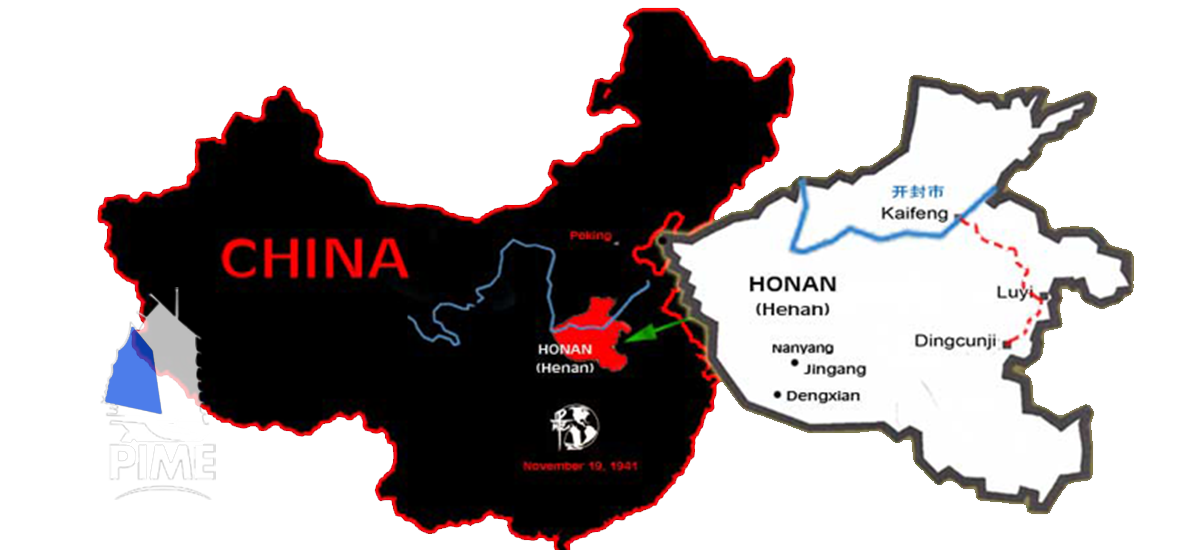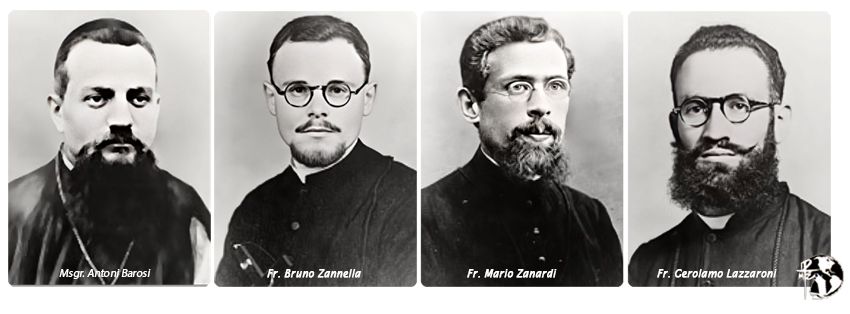

on November 19, 1941, four Priests from the Pontifico Istiutto Missioni Estere, assigned to
the Vicarate of Kaifeng, were murdered in the town
of Dingunji.
MARTYRDOM AT DINGCUNJI (NOVEMBER 19, 1941)
It is November 19, 1941, an autumn Sunday afternoon. The first winds out of the north chill the air. But in Dingcunji there is an air of festivity, in spite of the gray skies. Bishop Barosi is here for a pastoral visit. Every Christian has done as much as possible so that the village, notwithstanding the difficult times, appears worthy of this solemn occasion. This is the first time that a bishop has ever visited this community in person.
The pastor, Fr. Zanella, has insisted that the bishop come to confer the sacrament of Confirmation. The Confirmation candidates of other nearby villages also gather in Dingcunji, staying with friends or relatives, and by Saturday there is a lot of commotion as people arrive and try to get settled. Those too far away, and those who would have had to travel through areas flooded by the Yellow River, will be visited on Sunday afternoon by the bishop, accompanied by Frs. Zanella, Lazzaroni, and Zanardi.
Once the confirmation liturgy is completed in the morning, the bishop spends some time with the catechists, the confirmands, and their relatives. Then everyone goes to lunch. At 1 :00 an official with ten soldiers enters the residence of the missionaries. After putting out the Chinese Christians, he closes the door and sets a troop of well armed soldiers to guard it. A kind of curfew is imposed upon the whole village of Dingcunji.
Fr. Pollio (who would become the bishop of Kaifeng in 1947) describes what happens in the first pages of his diary, then sends a more detailed account to the superior general of P.LM.E., Bishop Mario Balconi. From this account we know the particulars of the homicides.
The official and the soldiers, as soon as they enter the house, ask for Fr. Zanella, who comes forward immediately. The soldiers take him to a room in front, where the fathers had barely finished lunch, on the pretext of asking him some questions. Almost simultaneously, they ask for Fr. Lazzaroni, who is led to the sacristy, told not to move, and is left with guards at the door. The official and the soldiers go directly to the room where the bishop is chatting with the other missionary. Bishop Barosi has an identification card issued by the Japanese, a pass which enables him to move about in the areas controlled by Japanese forces. This is the excuse the soldiers use to accuse all four missionaries of being "spies of the enemy and agents of capitalism." The bishop tries kind words with the official, but at his signal, the soldiers bind Bishop Barosi and Fr. Zanardi hand and foot. Fr. Zanardi begins to shout. Immediately they are dragged to the church and thrown to the ground, their mouths and ears stuffed with paper.
At this point the soldiers bind the eyes of one of Bishop Barosi's domestics, Han, who has come with the fathers from Kaifeng, so that he could not testify to what would happen next. The cook, however, is in a position to know the details. He is in the kitchen, hiding in fear in a corner, covered with straw and firewood. From here, he witnesses the martyrdom of Fr. Zanella. The soldiers bring Fr. Bruno outside the room, and pour boiling water and oil into his mouth from large containers. Between life and death, the father cries out often in a language the servant doesn't understand, and other times insists that they have no weapons or money. With a loud howl he implores the help of Bishop Barosi and Fr. Zanardi, but receives no response. Finally the soldiers, after making him drink the boiling water and oil many times, leave his body, unconscious or dead, in the small courtyard. No one can say whether Fr. Zanella dies in that courtyard, or at the bottom of the well into which he would later be thrown. The cook, meanwhile, sees that the soldiers are forcing the bishop and Fr. Mario toward the other courtyard.
After looting the house of any precious or useful items, the soldiers leave Dingcunji around 5:00 PM. They disappear into the darkness on boats, while freezing rain begins to fall in the quiet of the evening. Only at this point do the Christians approach the residence. They force open the door and find Han tied up in the entranceway. They free him and begin to search for the fathers. They call out, but receive no response. There is no trace of blood nor of bodies in the ransacked house. As yet, they do not suspect what has happened, especially since they had not heard any gun fire. Against all hope, they think that the missionaries have been taken hostage. They continue to call out, to search every corner, but find nothing. Finally, someone notices that the wall around the well is crumbled and bricks are completely obstructing its mouth (this would not be a difficult task, since Chinese wells are very narrow). They look on silently; no one dares to reveal the suspicions of their hearts: there must be something under those bricks. They begin clearing them away and the bodies of the victims appear. With long bamboo poles and a hook, they try to bring the bodies up. The first is Fr. Zanella, then Fr. Zanardi, and then Bishop Barosi. It is already late and they have not yet been able to find the body of Fr. Lazzaroni. They work fruitlessly for some more hours, and then give up for the night. At the first light of dawn, they are finally able to recover the body of Fr. Lazzaroni, who almost certainly was thrown into the well alive.
Fr. Gerolamo Lazzaroni was 27 years old, and only two years in the mission; Fr. Bruno Zanella was 32, in the mission for five years; Fr. Mario Zanardi had just turned 37 and had been in the mission for 14 years; Bishop Antonio Barosi was 40 years old, of which 16 were spent in China.
home



